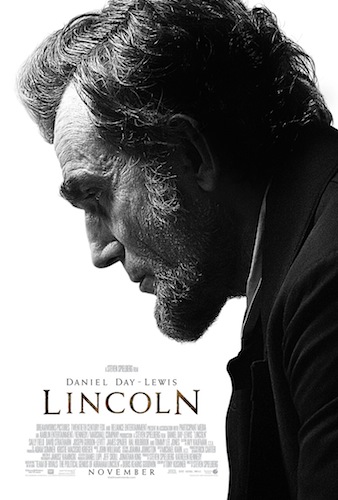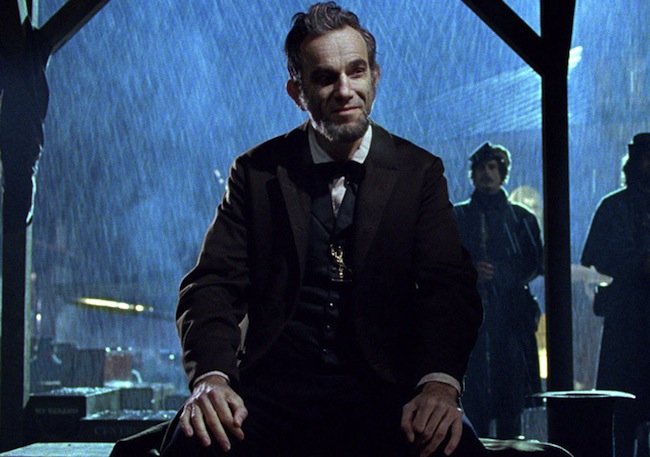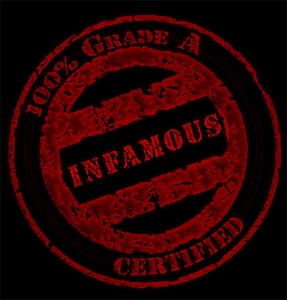
I wonder if Steven Spielberg’s long-awaited LINCOLN would have worked better as a play, because for large bouts of the film’s bloated running time, that’s exactly what it feels like. Spielberg’s biopic of sorts about a specific period of time in the 16th President’s life carries with it the vibe of a stage production, relying on overacted character performances to convey certain archetypes for their real-life historical counterparts while lacking any clear vision of story as it tries to wedge far too much material quite sloppily into a plot line that has no real room for extraneous parts. Frankly, I’m a little disappointed that after all the excitement that came from the very idea of Spielberg doing a picture on LINCOLN and waiting those years for him to finally take on the subject, this is the film it amounted to… this is the best he could do.
LINCOLN focuses entirely on Lincoln’s struggle with the House of Representatives back in 1865 to pass the 13th Amendment, which abolished slavery, while at the same time fighting to bring an end to the fighting of the Civil War, thus beginning the process of healing the nation as a whole. Having been re-elected during these tough times, it’s quite apparent how much love and respect the American people had for their President, a fact Lincoln is often reminded of by his Cabinet, who beg and plead for him not to waste his power on an amendment that is sure to be defeated when he could do so many other things from his place in the Oval Office. However, this isn’t just a matter of using the abolishment of slavery as a tool to potentially end the war, threatening the Confederacy with it in the hopes that it’d force surrender. Slavery is an idea that Lincoln could never wrap his head around, unable to digest the fact that man could tolerate and accept inequality against their fellow man, and, as a two-term President, this is his opportunity to take on an issue that’s long troubled him. It’s not just about now either… but the effect such an Amendment would have on future generations in America.
Only Spielberg and writer Tony Kushner do a disservice to such a historic moment by cheapening it as being the emotional equivalent of a sports movie. Lines are clearly drawn between the political parties with Lincoln’s Republicans acting the part of heroes while the opposing Democrats might as well just be the hated Yankees or the Cowboys or Iceland or any number of villainous squads that have taken the field, the court, the ice, etc. Looking back in retrospect, it’s easy to see where one party was just on the wrong side of history here, but at the time, such a distinction wasn’t so clear, so for LINCOLN to paint it as so black and white really takes away from the history being lost in such an approach. It’s a shallow way to attempt to touch the emotions of the audience by disguising an eventual showdown on the House floor over the Amendment as this rah-rah moment. The history is very clear, so building the uncertainty of the vote with this false tension feels forced and contrived for cinematic purposes.

Daniel Day-Lewis is what absolutely makes LINCOLN as good as it is, which is still only average at best, morphing into the late President with a subtle and very naturalistic performance. While the cast around him acts like their historical figures, Day-Lewis simply becomes his. And that lends to this idea that LINCOLN often times feels like a play. When your lead is so good that you can absolutely envision him as the character he’s portraying, it makes everything else look like an over-dramatization. Every moment his Lincoln is on-screen, Day-Lewis absolutely commands the movie, and gives you insight into the adoration citizens had for Abraham Lincoln… because watching him operate, you develop an adoration for him, too. All eyes are on him as he relays another anecdote or delves into another story or lays the foundation for another joke, and you’re left hanging on his every word, because he embodies that certain “It” that all great leaders have. You get a sense of the frustration he’s feeling as he puts his heart into combating this institution of America at the time that he so strongly opposes. And as the film wears on, you start to see some cracks in his strong façade, dealing with the issues that have impacted his family and his marriage over the years.
But it’s in those instances where LINCOLN really feels as if it is trying to do too much. With all of the attention of the film being paid to this fight over the Amendment and movement towards peace between the North and South, there’s really no room at all for dealing with these family conflicts between Lincoln and his wife Mary Todd (Sally Field) or his son Robert (a criminally underused Joseph Gordon-Levitt). Those would have been fine aspects of Lincoln’s life to explore further if LINCOLN was that sort of biopic. However, making the choice to not have an expansive examination of the whole of Lincoln and to focus on this small window of his life and, more specifically, his political career, quick hitting into his personal affairs lacks any sort of emotional weight whatsoever. It’s hard to care about the man when the only portrait we’re giving to see is of the politician.
There are a number of small supporting roles that do warrant praise. The trio of James Spader, John Hawkes and Tim Blake Nelson as William Bilboe, Robert Latham and Richard Schell, secret operatives used by the President in order to secure the votes necessary for the Amendment’s passage, provide nearly all of the film’s lighter moments. And while they can be a bit too comical at times, it’s easily forgiven as they are stealing every scene in which they’re involved. Jared Harris brings forth another of the film’s much more realistic performances as Ulysses S. Grant. It’s a shame that we don’t see more of the battlefield in LINCOLN, because not only might it help raise the impact of the Civil War throughout the film by seeing the toll it is taking on the country but it would have meant more of Harris’ Grant. I’d sign up to watch a Grant biopic with Harris in the role with the quickness, as LINCOLN didn’t do nearly enough with this wonderful yet incredibly small role.
LINCOLN is a Civil War in and of itself. Basically, there’s Daniel Day-Lewis… and then there’s the rest of the film. It would be unfortunate not to observe such a master at work with his craft, but seeing Day-Lewis’ incredible turn as Lincoln means actually sitting through the rest of LINCOLN. The actor again makes another film worth the trouble, but know that in order to take it in, you’re in for what is sure to feel like a very long ride.
-Billy Donnelly
"The Infamous Billy The Kidd"
Follow me on Twitter.
Like me on Facebook.

